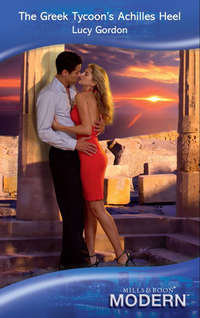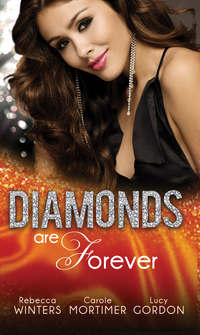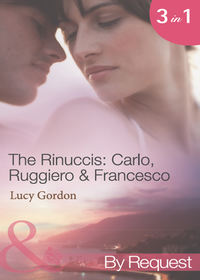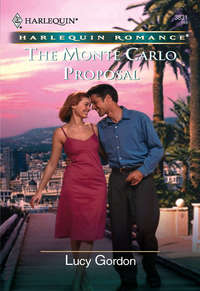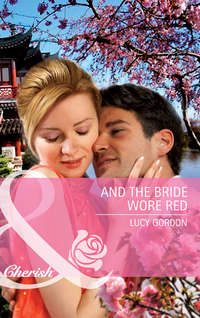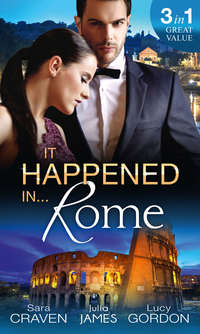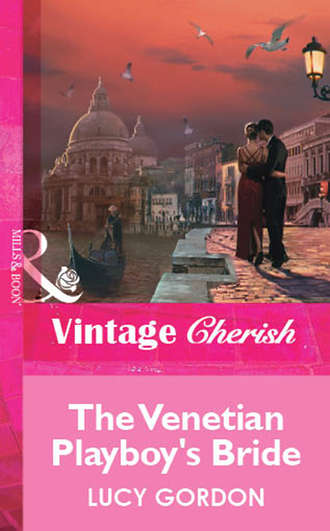
Полная версия
The Venetian Playboy's Bride
To one side was another pair of double doors, through which Dulcie found her bedroom, with a bed large enough to sleep four. She gasped, overwhelmed by such opulence. A maid appeared, ready to unpack her luggage. Just in time she remembered Roscoe’s orders to ‘splash it about a bit’ and distributed tips large enough to get herself talked about even in this place.
When everyone had gone she sat in silence, trying to come to terms with the shock of being here, alone, when she should have been here as a blissful bride.
She forced herself to confront the memory of Simon, painful though it was. He’d assumed that Lady Dulcie Maddox, daughter of Lord Maddox, must have a potful of family money hidden somewhere. He’d courted her ardently, using practised words to sweep her away in a magic balloon, to a place where everything was love and gratification.
But the balloon had fallen to earth, with her in it.
Simon had lived lavishly—all on credit, as she’d later discovered. She hadn’t cared about his money, only about his love. But the one was as illusory as the other.
He’d shown her the Hotel Vittorio’s brochure one evening when they were dining at the Ritz. ‘I’ve already made our honeymoon booking,’ he’d said, ‘in the Empress Suite.’
‘But darling, the cost—’
‘So what? Money is for spending.’
She’d spoken with passionate tenderness. ‘You don’t have to spend a lot on me. Money isn’t what it’s about.’
His quizzical frown should have warned her. ‘No, sweetie, but it helps.’
Then she’d said—and the memory tormented her still— ‘You don’t think I’m marrying you for your money do you? I love you, you. I wouldn’t care if you were as poor as I am.’
She could still see the wary look that came into his eyes, and sense the chill that settled over him. ‘This is a wind up, right? As poor as Lady Dulcie Maddox.’
‘You can’t eat a title. I haven’t a penny.’
‘I heard your grandfather blew twenty grand at the races in one day.’
‘That’s right. And my father was the same. That’s why I haven’t a penny.’
‘But you lot have all got trust funds, everyone knows that.’
The truth had got through to her now, but she fought not to face it. ‘Do I live like someone with a trust fund?’
‘Go on, you’re just slumming.’
She’d finally convinced him that she wasn’t, and that was the last time she saw him. Her final memory was of him snatching a credit card statement from his pocket and tossing it at her with the bitter words, ‘Do you know how much money I’ve spent on you? And for what? Well, no more.’
Then he stormed out of the Ritz, leaving her to pay for the meal.
And that had been that.
Sitting in the quiet of the Empress Suite Dulcie knew that it was time to pull herself together. Now there was another fortune hunter, but this time he was the prey and she the pursuer, seeking him out for retribution, the avenger of all women.
She showered in a gold and marble bathroom and chose something to wear for her first outing ‘on duty’. She finally left the hotel arrayed in an orange silk dress, with a delicate pendant of pure gold. Gold earrings and dainty gilt sandals completed the ensemble. So much gold might be overdoing it, but she needed to make an impression, fast.
When she’d finished she took a final look at the picture, to make sure his face was imprinted on her mind. She dismissed the baby-faced boy at the back. There was the one she wanted, playing the mandolin, over-flowing with confidence, smiling at Jenny, no doubt serenading her with honeyed words. The rat!
Finding one gondolier among so many was a problem, but she’d come prepared. Guidebooks had told her about the vaporetto, the great water buses that transported passengers along the Grand Canal, so she headed for one of the landing stages, boarded the next boat, and took up a position in the front, armed with powerful binoculars.
For an hour the vaporetto moved along the canal, criss-crossing to landing stages on each side, while Dulcie searched for her quarry, without success. At the end of the line she turned back and started again. No luck this time either, and she was almost about to give up when suddenly she saw him.
It was only a glimpse, too brief to be sure, but there was the gondola gliding between two buildings while she frantically focused the binoculars, catching him clearly only at the last moment.
The vaporetto was about to cast off from a landing stage. Dulcie moved fast, jumping ashore just in time and looking desperately about her. The gondola had vanished. She plunged down an alley between tall buildings to a small canal at the far end. No sign of him there, but he must be somewhere to her left. She made for a tiny bridge, tore over it and into another dark alley.
At the far end was another small canal, another bridge. A gondola was heading towards her. But was it the same one? The gondolier’s face was hidden by a straw hat. She placed herself on the bridge, watching intently as the long boat neared, the oarsman standing at the far end.
‘Lift your head,’ she agonised. ‘Look up!’
He had almost reached the bridge. In a moment it would be too late. Driven by desperation she wrenched off one of her shoes and tossed it over the side. It struck his hat, knocking it off, before landing exactly at his feet.
Then he looked up, and there was the face she’d come to Venice seeking, the face of the mandolin player. Eyes of fierce, startling blue, set in a laughing face, seemed to seize her, hold her, almost hypnotise her, so that she found herself smiling back.
‘Buon giorno, bella signorina,’ said Guido Calvani.
CHAPTER TWO
NO SOONER were the words out of his mouth than he’d vanished under the bridge. Dulcie dashed to the other side as he emerged and began to negotiate his way to the shore. She took a quick look at the picture to make sure she had the right man. Yes, there he was, smiling at Jenny, playing the mandolin.
Thank goodness he didn’t have a passenger, she thought as she hobbled off the bridge and along to where he’d pulled in.
‘I’m so sorry,’ she called. ‘I just turned my foot and the shoe slid off and went right over the side of the bridge before I could grab it. And then it hit you on the head. I’ll never forgive myself if you’re hurt.’
He grinned, holding up the dainty gilt sandal with its absurdly high heel.
‘But I am hurt, very badly. Not in my head but—’ he bowed gallantly with his hand over his heart.
This was what she’d expected. Practised charm. Right! She was ready for him.
He’d pulled in by a short flight of steps that ran down into the water.
‘If you will sit down, I’ll return this to you in the proper fashion,’ he said.
She sat on the top step and felt her ankle grasped in strong, warm fingers as he slid the shoe back onto her foot, adjusting it precisely.
‘Thank you—Federico.’
He gave a little start. ‘Fed—?’
‘It’s written there.’ Dulcie pointed to a label stitched near his collar, bearing the name Federico.
‘Oh, yes, of course,’ Guido said hurriedly. He’d forgotten Fede’s mother’s habit of sewing nametapes on the gondolier shirts of her husband, two brothers and three sons. No matter. He would simply tell her his real name. But he became distracted by the feel of her dainty ankle in his palm, and when he looked up he found her watching him with a quizzical look that drove everything else out of his mind. What did names matter?
‘And you are new to Venice?’ he asked.
‘I arrived only today.’
‘Then you must accept my apologies for your rough introduction to my city. But let me say also that the stones of Venice will not be kind to those shoes.’
‘It wasn’t very bright of me to wear such high heels, was it?’ she asked, looking shamefaced. ‘But I didn’t know, you see. Venice is so different to anywhere else in the world, and there’s nobody to tell me anything.’ She managed to sound a little forlorn.
‘That’s terrible,’ he said sympathetically. ‘For a beautiful young lady to be alone is always a shame, but to be alone in Venice is a crime against nature.’
He said it so delightfully, she thought. Lucky for her she was armed in advance.
‘I’d better go back to my hotel and change into sensible shoes before I have another accident.’ She became aware that his fingers were still clasped about her ankle. ‘Would you mind?’
‘Forgive me.’ He snatched back his hand. ‘May I take you to your hotel?’
‘But I thought gondoliers didn’t do that. Surely you only do round trips?’
‘It’s true that we don’t act like taxis. But in your case I would like to make an exception. Please—’ He was holding out his hand. She placed her own hand in it and rose to her feet, then let him help her down the steps to the water.
‘Steady,’ he said, helping her into the well of the gondola, which rocked, forcing her to clutch him for safety.
‘You sit here,’ he said, settling into the rear-facing seats, an arrangement that would enable him to see her face. ‘It’s better if you don’t face the front,’ he hurriedly improvised. ‘At this hour people get the setting sun in their eyes. And you might get seasick,’ he added for good measure.
‘I’ll do just as you say,’ she agreed demurely. She supposed she could be blinded by the setting sun from either direction, depending on which route he took, but she appreciated his strategy.
It suited her, too, to be able to lean back and stretch out her long, silk-clad legs before his gaze. True, she was supposed to be tempting him with the prospect of money, but there was no harm in using the weapons nature had bestowed.
He cast off, and for a while they went gently through narrow canals, where buildings rose sheer out of the water. They glided under a bridge and as it slid away she saw that it seemed to emerge direct from one building, over the water and straight into another. Dulcie watched in wonder, beginning to understand how this city was truly different from all others.
He was a clever man, she thought. He knew better than to spoil it by talking. Only the soft splash of his oar broke the silence, and gradually a languor came over her. Already Venice was casting its spell, bidding her forget everything but itself, and give herself up to floating through beauty.
‘It’s another world,’ she murmured. ‘Like something that fell to earth from a different planet.’
An arrested look came into his eyes. ‘Yes,’ he said. ‘That’s exactly it.’
They seemed to drift for ages, one beauty crowding on the last, too many impressions for her to sort them out. Vaguely she remembered that this wasn’t why she was here. Her job was to work on the man standing there, guiding twenty-two feet of heavy, curved wood as though it was the easiest thing in the world.
She considered him, and found that she understood why a naïve, sheltered girl like Jenny found him irresistible. He was tall, not heavily built but with a wiry strength that she’d already felt when he’d helped her into the boat. Just a light gesture, but the steel had been there, unmistakable, exciting. He handled the heavy oar as though it weighed nothing, moving with it, lithe and graceful, as though they were dancing partners.
They passed into a wider canal, and suddenly the sun was on him. Dulcie looked up, shading her eyes against the glare, and at once he removed his straw boater and tossed it to her.
‘You wear it,’ he called. ‘The sun is hot.’
She rammed it onto her head and leaned back, taking pleasure in the way the light illuminated his throat and the strong column of his neck, and touched off a hint of red in his hair. How intensely blue his eyes were, she thought, and how naturally they crinkled at the corners when he smiled. And he smiled easily. He was doing so now, his head on one side as though inviting her to share a joke, so that she couldn’t help joining in with his laughter.
‘Are we nearly there?’ she asked.
‘There?’ he asked with beguiling innocence. ‘Where?’
‘At my hotel.’
‘But you didn’t tell me which hotel.’
‘And you didn’t ask me. So how do we know we’re going in the right direction?’
His shrug was a masterpiece, asking if it really mattered. And it didn’t.
Dulcie pulled herself together. She was supposed to toss the hotel name at him, advertising her ‘wealth’. Instead she’d revelled in the magic of his company for—good heavens, an hour?
‘The Hotel Vittorio,’ she said firmly.
He didn’t react, but of course, he wouldn’t, she reasoned. A practised seducer would know better than to seem impressed.
‘It’s an excellent hotel, signorina,’ he said. ‘I hope you are enjoying it.’
‘Well, the Empress Suite is a little overwhelming,’ she said casually, just to drive the point home.
‘And very sad, for a lady alone,’ he pointed out. ‘But perhaps you have friends who’ll soon move into the second bedroom.’
‘You know the Empress Suite?’
‘I’ve seen the inside,’ Guido said vaguely. It was true. His friends from America regularly stayed there, and he’d downed many a convivial glass in those luxurious surroundings.
I’ll bet you’ve seen the inside, Dulcie thought, getting her cynicism back safely into place.
‘When your friends arrive you’ll feel better,’ he said.
‘There are no friends. I’m spending this vacation on my own.’ They were pulling in to the Vittorio’s landing stage, and he reached out to help her onto land. ‘How much do I owe you?’ she asked.
‘Nothing.’
‘But of course I must pay you. I’ve had an hour of your time.’
‘Nothing,’ he repeated, and she felt his hand tighten on her wrist. ‘Please don’t insult me with money.’ His eyes were very blue, holding hers, commanding her to do what he wished.
‘I didn’t mean to insult you,’ she said slowly. ‘It’s just that—’
‘It’s just that money pays for everything,’ he finished. ‘But only if it is for sale.’ He spoke with sudden intensity. ‘Don’t be alone in Venice. That’s bad.’
‘I don’t have a choice.’
‘But you do. Let me show you my city.’
‘Your city?’
‘Mine because I love it and know its ways as no stranger can. I would like you to love it too.’
It was on the tip of her tongue to make one of the flirtatious replies she’d been practising for just this moment, but the words wouldn’t come. She had a sense of being at the point of no return. To go on was risky and there would be no way back. But to withdraw was to spend a lifetime wondering ‘what if?’
‘I don’t think—’ she said slowly. ‘I don’t think I should.’
‘I think you should,’ he said urgently.
‘But—’
His hand tightened on hers. ‘You must. Don’t you know that you must?’
The glow of his eyes was almost fierce in its intensity. She drew a sharp breath. She didn’t come from a long line of gamblers for nothing.
‘Yes,’ she said. ‘I must.’
‘I’ll meet you at seven o’clock at Antonio’s. It’s just around the corner. And wear walking shoes.’
She watched as he glided away, then hurried up to her suite, glad of the time alone to gather her thoughts.
It wasn’t easy. In a few blazing moments he’d taken her ideas and tossed them into the air, so that they’d fallen about her in disorder. It took some stern concentration to reclaim her mind from his influence, but at last she felt she’d managed it.
Stage one completed successfully. Quarry identified, contact made. Ground laid for stage two. Professional detachment. Never forget that.
Guido got away from the hotel as fast as he could before he was spotted by someone who knew his true identity. In a few minutes he’d left the city centre behind and was heading for the little back ‘streets’ in the northern part of town, where the gondolier families lived, and their boatyards flourished.
At the Lucci house he found Federico at home watching a football match on television. Without a word he took a beer from the fridge and joined him, neither speaking until half time. Then, as he always did, Guido put the money he’d earned on the table, nearly doubling it with extra from his own pocket.
‘I had a good day, didn’t I?’ Fede said appreciatively, pocketing the money with a yawn.
‘Excellent. You’re an example to us all.’
‘At this rate I think I’ve earned a holiday.’
‘I know I have.’ Guido rubbed his arms, which were aching.
‘Perhaps it’s time you got back to the souvenir trade.’
Guido had established his independence of the Calvani family by setting up his own business, catering to tourists. He owned two factories on the outlying island of Murano, one of which made glass, and the other trinkets and souvenirs.
‘I suppose it is,’ he said now, unenthusiastically. ‘It’s just that—Fede, have you ever found yourself doing something you never meant to do—just a word, a choice to be made in a split second? And suddenly your whole life has changed?’
‘Sure. When I met my Jenny.’
‘And you don’t know how it’s all going to end, but you do know that you have to go on and find out?’
Fede nodded. ‘That’s just how it is.’
‘So what do I do?’
‘My friend, you’ve already supplied the answer. I don’t know what’s happened, but I do know it’s too late for you to turn back.’
An important decision demanded long, serious deliberation, so when Dulcie opened the palatial wardrobe to select something suitable for the coming evening she went through the multitude of dresses with great care.
‘How did I ever buy all this?’ she murmured.
She’d gone to Feltham’s, as instructed, and found the staff already primed with Roscoe’s demands. As these would have resulted in her looking like a Christmas tree Dulcie had waved them aside and insisted on her own kind of discreet elegance. After four outfits she tried to call a halt, but the superior person assigned to assist her was horrified.
‘Mr Harrison said the bill must be at least twenty thousand,’ she’d murmured.
‘Twenty thou—? He can wear them then.’
‘He’ll be most displeased if we don’t live up to his expectations. It could cost me my job.’
Put like that, it became a duty to spend money, and by the time she’d left the luxury store she was the owner of five cocktail dresses, two glamorous evening gowns, three pairs of designer jeans, any number of designer sweaters, a mountain of silk and satin underwear, and a collection of summer dresses. Some expensive makeup and perfume, plus several items of luggage completed the list.
She surveyed her booty now, hanging in the hotel’s luxurious, air-conditioned closets, in a mood of ironic depression. This ought to have been a fun job, the chance to be Cinderella at the ball. If only it hadn’t been Venice, and if only the high life she was to lead hadn’t been so much like the life her Prince Charmless had expected of her.
Why had she accepted this assignment, in a place where every sight and sound would hurt her. Was she mad?
Then she set her chin. This was a chance to make a man pay for his crimes against women. She must never forget that.
She took so long making her choice that she was late when she finally hurried downstairs wearing a cocktail dress of pale-blue silk organza with silver filigree accessories. Her silver shoes had heels of only one inch, which was the nearest she could get to ‘sensible’.
Antonio’s was a tiny place with tables outside, sheltered by a leaf-hung trellis. It looked charming, but there was something missing. Him!
No matter, he’d be inside. She sauntered in, looking casual, but her air of indifference fell away as she saw no sign of him here either.
He’d stood her up!
It was the one thing she hadn’t thought of.
Be reasonable, she thought. He’s just a few minutes late—like you.
That’s different, replied her awkward self. He’s supposed to be trying to seduce me, and he can’t even be bothered to do it properly.
Setting her jaw she marched out and collided with a man hurtling himself through the door in the other direction.
‘Mio dio!’ Guido exploded in passionate relief. ‘I thought you’d stood me up.’
‘I—?’
‘When you didn’t come I thought you’d changed your mind. I’ve been looking for you.’
‘I was only ten minutes late,’ she protested.
‘Ten minutes, ten hours? It felt like forever. I suddenly realised that I don’t know your name. You might have vanished and how could I have found you again? But I’ve found you now.’ He took her hand. ‘Come with me.’
He was walking away, drawing her behind him, before she could stop and think that once more he’d reversed their roles, so that he was now giving orders. But she followed him, eager to see where he would lead her, and curiously content in his company.
He’d changed out of his working clothes into jeans and a shirt of such snowy whiteness that it gave him an air of elegance, and made a contrast with his lightly tanned skin.
‘You could have found me quite easily,’ she pointed out as they strolled hand in hand. ‘You know my hotel.’
‘To be sure, I could go into the Vittorio and say the lady in their best suite has given me the elbow and would they please tell me her name? Then I think I should start running before they throw me out. They’re used to dealing with dodgy characters.’
‘Are you a dodgy character?’ she asked with interest.
‘They’d certainly think so if I told them that tale. Now where shall we go?’
‘You’re the one who knows Venice.’
‘And from the depths of my expert knowledge I say that we should start with an ice cream.’
‘Yes please,’ she said at once. There was something about ice cream that made a child of her again. He picked up the echo and grinned boyishly.
‘Come on.’
He led her into a maze, where streets and canals soon blurred into one. Flagstones underfoot, alleys so narrow that the old buildings almost seemed to touch each other overhead, tiny bridges where they lingered to watch the boats drift underneath.
‘It’s all so peaceful,’ she said in wonder.
‘That’s because there are no cars.’
‘Of course.’ She looked around her. ‘I hadn’t even realised, but it’s obvious.’ She looked around her again. ‘There’s nowhere for cars to go.’
‘Right,’ he said with deep satisfaction. ‘Nowhere at all. They can leave the mainland and come out over the causeway as far as the terminal. But then people have to get out and walk. If they don’t want to walk they go by boat. But they don’t bring their smelly, stinking cars into my city.’
‘Your city? You keep saying that.’
‘Every true Venetian speaks of Venice as his city. He pretends that he owns it, to hide the fact that it owns him. It’s a possessive mother who won’t release him. Wherever he goes in the world this perfect place goes with him, holding onto him, drawing him back.’ He stopped himself with an awkward laugh. ‘Now Venice thinks we should go and eat ice cream.’
He took her to a small café by a little canal so quiet that the world might have forgotten it. He summoned a waiter, talking to him in a language Dulcie didn’t recognise, and making expansive gestures, while giving her a look of wicked mischief.
‘Were you speaking Italian?’ she asked when they were alone again.
‘Venetian dialect.’
‘It sounds like a different language to Italian.’
‘In effect it is.’
‘It’s a bit hard on tourists who learn a bit of Italian for their vacation, and then find you speaking Venetian.’
‘We speak Italian and English for the tourists, but amongst ourselves we speak our dialect because we are Venetian.’
‘Like a another country,’ she said thoughtfully.
‘Of course. Venice was once an independent republic, not just a province of Italy, but a state in its own right. And that’s still how we feel. That is our pride, to be Venetian first, before all other allegiances.’
As before, there was a glow on his face that told her he felt passionately about this subject. She began to watch him intently, eager to hear more, but suddenly the waiter appeared with their order, and he fell silent. She had a sense of let-down, and promised herself that she would draw him back to this subject later.


